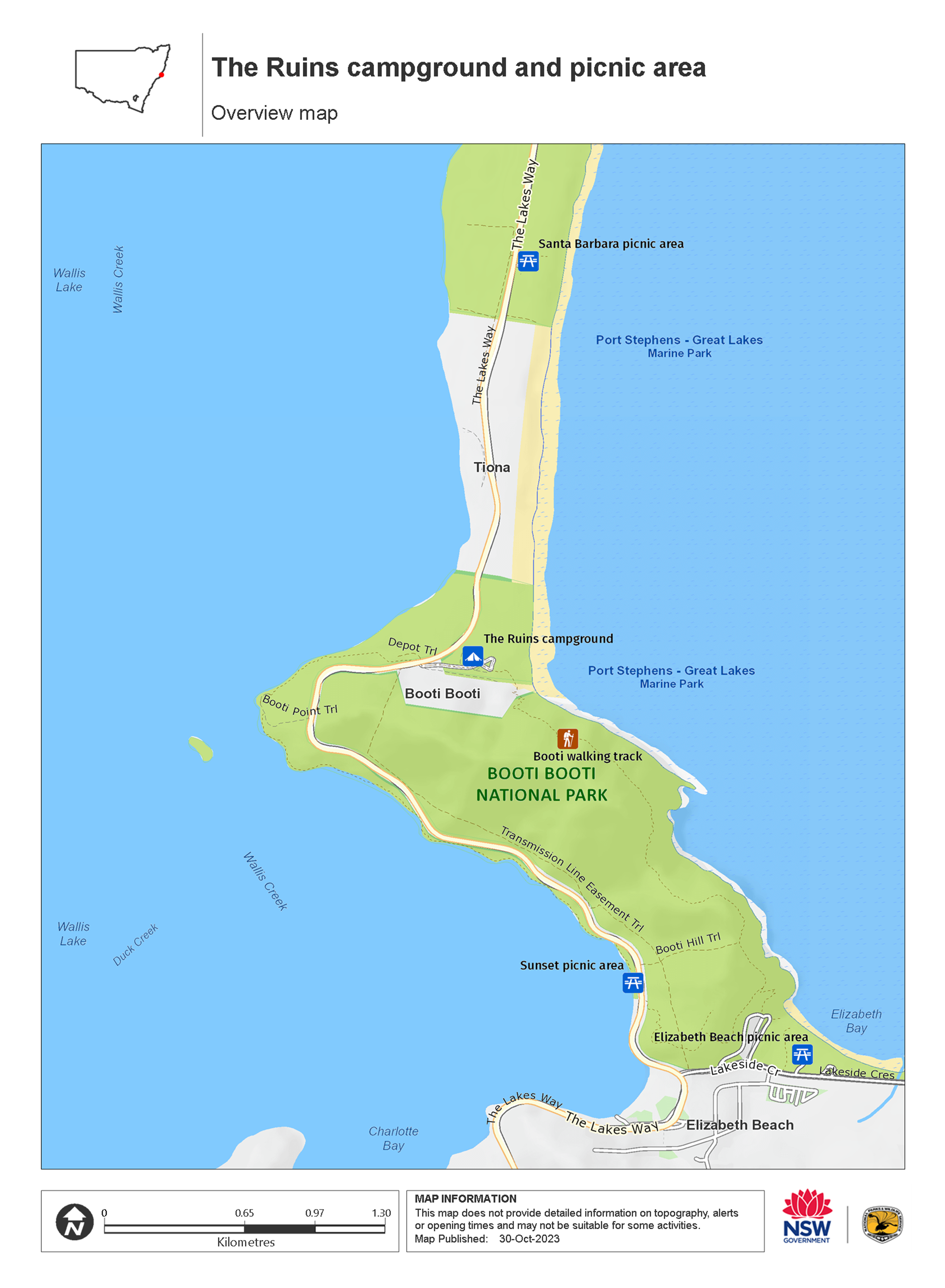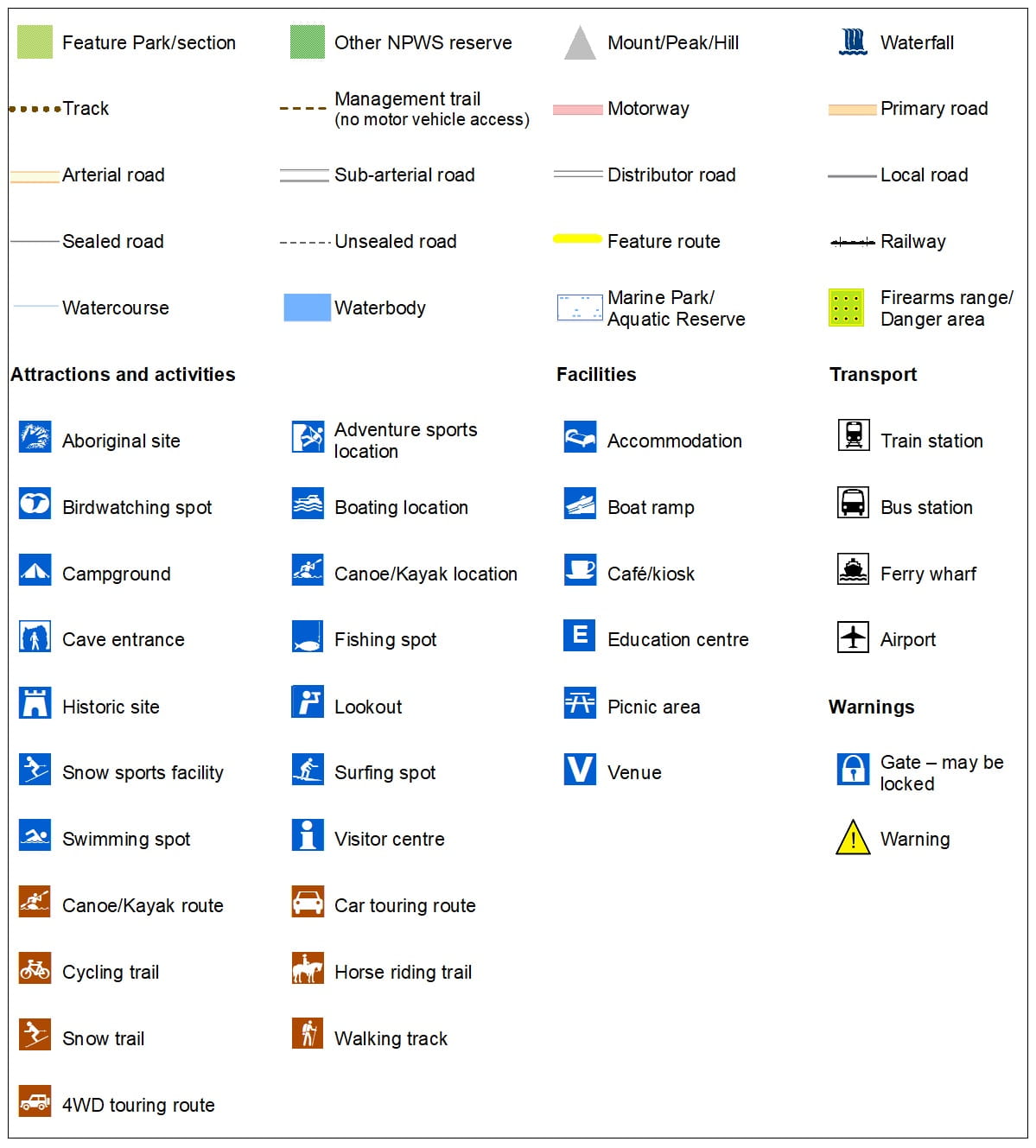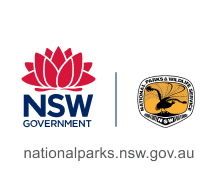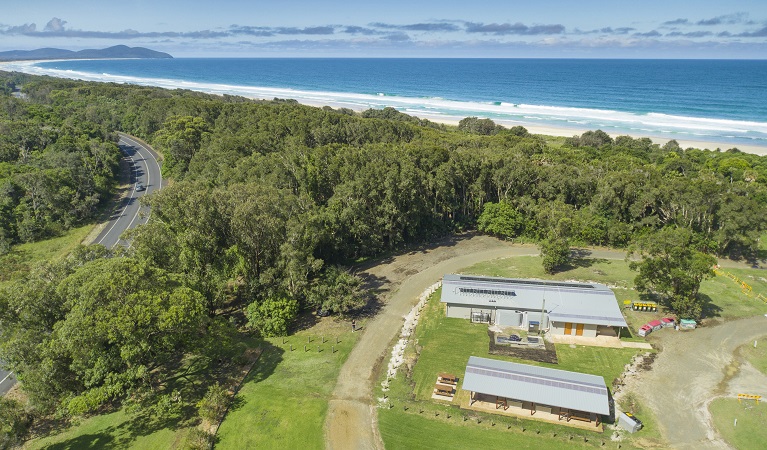Overview
Located just 15km south of Forster, The Ruins campground is well equipped and a convenient base to explore nearby beaches, walking and whale watching activities.
| Number of campsites | 96 |
|---|---|
| Camping type | Tent, Camper trailer site, Caravan site, Camping beside my vehicle |
| Where | 4374 The Lakes Way, Booti Booti , NSW, 2428 - in Booti Booti National Park |
| Facilities | Toilets, showers, unpowered sites, marked sites, drinking water, barbecue facilities, picnic tables, rubbish bin, carpark |
| Entry fees |
Park entry fees apply and are not included in your camping fees. |
| Group bookings | Book up to 20 people or 5 sites online. For larger groups, make a group booking enquiry. |
| Please note |
|
From rugged campers to casual caravaners, The Ruins campground is the perfect spot for nearly anyone. A beautiful area fringed by cabbage tree palms and paperbarks, it has everything you need, from picnic tables and barbecues to hot showers and drinking water.
But the real charm lies in what’s nearby. Whether you prefer the beach or a sheltered lake, both are just a stone’s throw away. Seven Mile Beach offers gorgeous sand and whale watching in the winter. Wallis Lake is perfect for relaxing beneath a tree or launching the kayak for a cool afternoon paddle.
You can even hike along the Booti walking track, which includes scenic lookouts and a direct link to Elizabeth Beach - perfect for surfing and seasonally patrolled. Keep your eyes open for graceful shore birds along the challenging walk.
But if all else fails and you just feel like taking time out relaxing with a coffee and a newspaper, The Ruins campground is also an easy drive from cafes in Pacific Palms.
Map

Map legend

Local alerts
For the latest updates on fires, closures and other alerts in this area, see https://www.nationalparks.nsw.gov.au/camping-and-accommodation/campgrounds/the-ruins-campground-and-picnic-area/local-alerts
Bookings
- National Parks Contact Centre
- 7am to 7pm daily
- 1300 072 757 (13000 PARKS) for the cost of a local call within Australia excluding mobiles
- parks.info@environment.nsw.gov.au
Park info
- in Booti Booti National Park in the North Coast region
Booti Booti National Park is always open but may have to close at times due to poor weather or fire danger.
-
Park entry fees:
$8 per vehicle per day. Day passes are available from the Manning Great Lakes Area Office or the Park'nPay app. You'll need a Day Pass or Annual Pass when visiting the park.
Buy annual pass.
Visitor info
All the practical information you need to know about the The Ruins campground and picnic area.
Getting there and parking
The Ruins campground and picnic area is located in Booti Booti National Park.
To get there from Forster:
- Follow The Lakes Way for 15km towards Pacific Palms
- Turn left into the campground
To get there from the Pacific Highway near Bulahdelah:
- Follow The Lakes Way for 45km
- Turn right into the campground
Road quality
- Sealed roads
Vehicle access
- 2WD vehicles
Weather restrictions
- All weather
Parking
- Tent and drive-on campsites allow for 1 vehicle to park directly on the site.
- Tent only campsites provide parking for a maximum of 2 vehicles next to the site.
- There's limited additional parking at this campground in informal grass and gravel carparks.
Best times to visit
There are lots of great things waiting for you in Booti Booti National Park. Here are some of the highlights.
Spring
See the park's magnificent wildflower displays as they bloom across the heathlands.
Summer
Swim at the seasonally patrolled Elizabeth Beach or kayak in Wallis Lake while staying at the nearby The Ruins campground.
Winter
Visit Cape Hawke lookout to watch whales migrating off the coast.
Weather, temperature and rainfall
Summer temperature
Average
15°C and 30°C
Highest recorded
45.2°C
Winter temperature
Average
5°C and 20°C
Lowest recorded
-5°C
Rainfall
Wettest month
March
Driest month
September
The area’s highest recorded rainfall in one day
280.2mm
Facilities
Campsites are marked, unpowered and suitable for motorhomes, caravans, camper trailers, campervans and tents.
Toilets
There are accessible flush toilets in the amenities block at the northern end of the campground. There's also another accessible toilet at the southern end of the campground.
- Flush toilets
Showers
There are accessible hot showers in the amenities block at the northern end of the campground.
- Hot showers
Types of sites
- Unpowered sites
- Marked sites
Drinking water
Barbecue facilities
- Gas/electric barbecues (free)
Picnic tables
There's a pavilion in the main part of the campground that has picnic tables, barbecues and dishwashing facilities. There's also a separate picnic area that has a barbecue shelter and picnic tables.
All picnic tables and shelters are set on concrete slabs. You'll need to cross over grass to reach them from your campsite.
Rubbish bin
Rubbish and recycling bins are available at the campground.
Carpark
Step-free access
The campground is mostly flat and there's step-free access, but there are no pathways. You'll need to cross over grass to reach the campground's facilities.
Maps and downloads
Accessibility
Disability access level - medium
- The campground is mostly flat and there's step-free access but no pathways. You'll need to cross over grass to get from your campsite to the campground's facilities.
- There are accessible toilets and showers.
- There are accessible picnic tables set on concrete slabs.
Prohibited
- Amplified music is not permitted
- Possession or use of fireworks is not permitted
- Please don't tie ropes to trees. It can cause damage which may lead to tree removal and the loss of shade
- Please be considerate of other campers and keep noise low—noise must stop from 10pm.
- This is a family friendly campground. Visitors displaying anti-social, offensive or dangerous behaviour will be asked to leave the campground.
Camp fires and solid fuel burners
Generators
Pets
Pets and domestic animals (other than certified assistance animals) are not permitted. Find out which regional parks allow dog walking and see the pets in parks policy for more information.
Smoking
NSW national parks are no smoking areas.
Learn more
The Ruins campground and picnic area is in Booti Booti National Park. Here are just some of the reasons why this park is special:
A haven for birds and birdwatchers alike

Booti Booti National Park features a substantial number of amphibians and reptiles, including red-bellied black snakes, brown snakes, rose-crowned snakes and blue-bellied swamp snakes. Goannas are regular visitors to The Ruins campground and picnic areas, and you may even be lucky enough to see a land mullet or water dragon. The unusual peninsula between the Pacific Ocean and Wallis Lake also provides an outstanding habitat for over 210 species of birds, including rainbow and scaly-breasted lorikeets, yellow-faced honeyeaters and silvereyes, as well as a number of waterbirds, including pelicans and the endangered little tern.
- Cape Hawke lookout Just five minutes from Forster, the Cape Hawke lookout offers spectacular views along the coast from the top of a dedicated tower, perfect for whale watching.
- Elizabeth Beach picnic area A short drive from Forster, Elizabeth Beach picnic area offers a great spot to relax near a beach popular for swimming in summer and whale watching in winter.
- Junior ranger: Booti Booti coastal adventure tour Join us for a Junior ranger adventure, as we traverse the shores of Seven Mile Beach. Walk alongside a Discovery Ranger to find out what plants and animals live here, and how they survive in this magical environment.
- Sailing Club picnic area An alternative to the ocean-front options of Booti Booti National Park, Sailing Club picnic area offers a shady rest spot on the shore of Wallis Lake.
Aye, Captain

Captain Cook first sighted Cape Hawke on May 12, 1770, and named it in honour of the First Lord of the Admiralty, Edward Hawke. The famous explorer and surveyor John Oxley later passed through the area in 1818. The first European inhabitant was Captain J. Gogerly, who sailed between Forster and Sydney ferrying timber, oyster shells, and sandstone. Today you can pay respects to Captain Gogerly and some of his relatives at their gravemarkers, across the road from the Ruins campground.
- Booti walking track Just 20km from Forster, Booti walking track is a loop walk which beautifully captures the park's scenic features and offers family-friendly opportunities for swimming and picnicking.
- Junior ranger: Booti Booti coastal adventure tour Join us for a Junior ranger adventure, as we traverse the shores of Seven Mile Beach. Walk alongside a Discovery Ranger to find out what plants and animals live here, and how they survive in this magical environment.
Spirituality, identity and lifestyle

Booti Booti National Park holds important cultural significance for the Worimi Aboriginal people, who have lived on and used the land and waters for many thousands of years. Dozens of Aboringal sites exist within the park, including artefact scatters, stone quarries, tool sites, and shell middens. These are important markers of Aboriginal history in the region, demonstrating how land, water, plants and animals contributed to and continue to have significance for Aboriginal identity, spirituality, and lifestyle.
- Aboriginal culture Bring your students to this unique excursion in Booti Booti National Park, near Forster. They’ll experience the park through the eyes of an Aboriginal person on this Stage 2 (Years 3-4) Aboriginal culture Geography excursion.
- Junior ranger: Booti Booti coastal adventure tour Join us for a Junior ranger adventure, as we traverse the shores of Seven Mile Beach. Walk alongside a Discovery Ranger to find out what plants and animals live here, and how they survive in this magical environment.
Plants and animals protected in this park
Animals
-

Humpback whale (Megaptera novaeangliae)
The humpback whale has the longest migratory path of any mammal, travelling over 5000km from its summer feeding grounds in Antarctica to its breeding grounds in the subtropics. Its playful antics, such as body-rolling, breaching and pectoral slapping, are a spectacular sight for whale watchers in NSW national parks.
-

Australian pelican (Pelecanus conspicillatus)
The curious pelican is Australia’s largest flying bird and has the longest bill of any bird in the world. These Australian birds are found throughout Australian waterways and the pelican uses its throat pouch to trawl for fish. Pelicans breed all year round, congregating in large colonies on secluded beaches and islands.
-

Grey-headed flying-fox (Pteropus poliocephalus)
The grey-headed flying fox is Australia's largest native bat, with a wingspan up to 1m. This threatened species travels up and down south-eastern Australia and plays a vital role in pollinating plants and spreading seeds in our native forests.
-

Lace monitor (Varanus varius)
One of Australia’s largest lizards, the carnivorous tree-dwelling lace monitor, or tree goanna, can grow to 2m in length and is found in forests and coastal tablelands across eastern Australia. These Australian animals are typically dark blue in colour with whitish spots or blotches.
-

Tawny frogmouth (Podargus strigoides)
Found throughout Australia, the tawny frogmouth is often mistaken for an owl due to its wide, powerful beak, large head and nocturnal hunting habits. The ‘oom oom oom’ call of this native bird can be heard echoing throughout a range of habitats including heath, woodlands and urban areas.
School excursions (4)
Bookings
- National Parks Contact Centre
- 7am to 7pm daily
- 1300 072 757 (13000 PARKS) for the cost of a local call within Australia excluding mobiles
- parks.info@environment.nsw.gov.au
Park info
- in Booti Booti National Park in the North Coast region
Booti Booti National Park is always open but may have to close at times due to poor weather or fire danger.
-
Park entry fees:
$8 per vehicle per day. Day passes are available from the Manning Great Lakes Area Office or the Park'nPay app. You'll need a Day Pass or Annual Pass when visiting the park.
Buy annual pass
What's nearby:
Things to do (33)
- 4WD touring (1)
- Aboriginal culture (3)
- Beach (1)
- Birdwatching and wildlife encounters (14)
- Canoeing/paddling (6)
- Cycling (7)
- Fishing (7)
- Historic heritage (5)
- Horse riding (1)
- Picnics and barbecues (15)
- Road trips and car/bus tours (2)
- Sailing, boating and cruises (2)
- Sightseeing (9)
- Surfing (3)
- Swimming (7)
- Walking (14)

